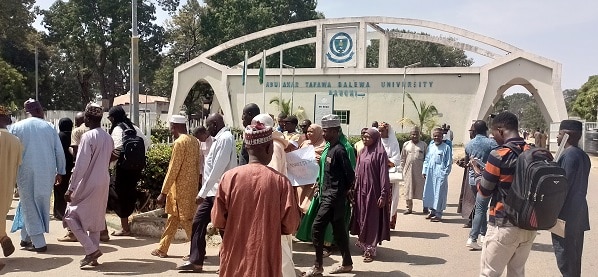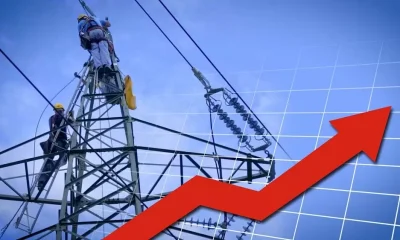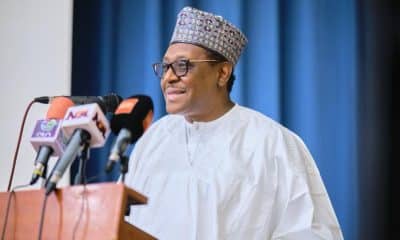Education
Bauchi ASUU Zone Holds Peaceful Protest, Tells FG To Clear Union’s Outstanding Salary

Members of the Bauchi zone of the Academic Staff Union of Universities (ASUU) have today held a peaceful protest as announced by the national umbrella of the union two days ago.
The protest, according to ASUU, is to drive home their demands for the federal government to pay their seven-month salary backlogs, as well as show displeasure about the way the Nigerian government is treating academics like casual workers.
The ASUU Bauchi zone which comprises universities in Bauchi, Gombe, and Plateau states today held what they described as a peaceful protest.
Naija News gathered that the Bauchi ASUU zone commenced the protest from its secretariat located in the Abubakar Tafawa Balewa University (ATBU), Bauchi to the institution’s main gate and back to the university premises.
Naija News also learnt that members were seen on campus holding placards with different inscriptions as well as singing solidarity songs, while they protested.
The ASUU branch chairman of the Abubakar Tafawa Balewa University (ATBU), Dr Ibrahim Ibrahim Inuwa appealed to well-meaning Nigerians to prevail on the issue with the federal government.
Inuwa said it was a matter of urgency and national interest for the federal government to clear the outstanding salary of members of the union.
The ATBU ASUU chairman told pressmen after the protest that the union would not stop defending the public university system in the country with all legitimate means.
Inuwa advanced that members of the union can not be cowed by tyrants, noting that ASUU has deployed several diplomatic means to persuade the government to address the contentious issues in the public universities but all fell on deaf ears.
In an article Inuwa titled ‘FGN Deceitful and Unpatriotic plan to Privatize Nigerian Public Universities,’ he explained that the union’s demands are legitimate.
The piece reads “For the avoidance of doubts, we wish to state clearly that we shall continue to defend the University system and the Nigerian State through all legitimate means, we cannot be cowed by tyrants.
“It is no longer news that Nigerian public universities were shut down for eight months from 14th February 2022 to 14th October 2022.
“The industrial action was embarked upon to call the attention of the Nigerian government to address the lingering issues bedevilling the Nigeria public universities. The Union called off the strike in respect of a court order, the intervention of well-meaning Nigerians, as well as the intervention of the Honourable Speaker of the House of Representatives, Rt Honourable Femi Gbajabiamila and the leadership of the House of Representative (HOR).
“As a patriotic Union, ASUU for years has been calling on the Government both at State and Federal levels to accord the Nigerian Public Universities a befitting and conducive learning environment that will drive the nation’s well-being through inclusivity and global competitiveness. These were conspicuously captured in the FGN/ASUU agreement of 2009.
“The Union is not surprised that the Nigerian ruling class who are saddled with the responsibility of managing the country and are supposed to be at the forefront of championing the course of partnering with the academia to actualize and sustain the nations’ inclusivity and global competitiveness, are the ones’ deliberately and actively working against these feats.
“As a law-abiding Union, ASUU deployed several diplomatic means to persuade the government to address the contentious issues in the public universities but all fell on deaf ears.
“Thereafter, just like on other occasions, the Union was left with no choice but to declare a nationwide strike on the 14th of February 2022 to drive home its demands.
“For the avoidance of doubt, the issues that necessitated the strike are: Earned Academic Allowance (EAA) ii. Funding for the revitalization of public Universities; Proliferation of Universities; Visitation Panel and Renegotiation of the FGN/ASUU Agreement of 2009.
“Others are; the replacement of the Integrated Payroll and Personnel Information System (IPPIS) with the University Transparency and Accountability Solution (UTAS) and withheld salaries and non-remittance of check-off dues.
“These aforementioned demands are legitimate and long overdue. The Earned Academic Allowances (EAA), are allowances of academic staff earned through excess workloads they’ve done and administrative work assigned to them by their respective universities. To date, the governments are an owing backlog of the EAA.
“In the FGN/ASUU agreement of 2009 which captures conditions of service, funding, university autonomy & academic freedom, and other matters, the government is expected to honour the agreement by providing funds for revitalizing public universities.
“However, it took the Union another strike to compel the government to set up a NEEDS Assessment committee to ascertain the level of rot and decay in Nigerian Public Universities. The committee recommended that the government should commit N1.3trillion to public universities to arrest the rot and decay in the system.
“The government agreed to pay this fund in six Tranches. After the release of the first tranche of N200 billion by the Jonathan administration in 2013, only N50 billion out of the N1.1 trillion outstanding has so far been released by the Buhari administration.
“While the Union is struggling day and night to ensure that the government fulfils the agreement it willingly signed with the Union, the governments at State and Federal levels became politically obsessed with the establishment of public universities, even where it is evidently clear that the existing ones are grossly underfunded.
“More so, Universities visitation panels, that statutorily afford Visitors of Universities (President/State governors) after every four years the opportunity to probe the management of the university operations in terms of finance, personnel, academic activities, and other matters were not conducted for over fifteen years; it took another ASUU strike in 2020 for the government to set up the visitation panels, but to date, the white papers for the visitations are still being awaited.
“A fundamental part of the FGN/ASUU 2009 agreement is that the agreement should be renegotiated after every three years to reflect the current economic realities. This is to discourage brain drain and attract qualified foreign academics. Unfortunately, the government is deliberately frustrating the renegotiation of the agreement.
“Thus encouraging brain drain and discouraging foreign academics & students from coming to Nigeria, and as such localizing the Nigerian public universities. This to a large extent is negatively affecting the quality of Nigerian graduates and the global ranking of Nigerian public universities.
“The introduction of the Integrated Payroll and Personnel Information System (IPPIS) as a payment platform in the public service and its forceful implementation in federal public universities has robbed the federal universities of their autonomy and academic freedom.
“The IPPIS regime resulted in haphazard payments of staff salaries, non-payment of promotion arrears, non-implementation of promotion, mutilation of salaries, untimely retirement of staff, and to this moment caused the withholding of a lot of university staff salaries, ranging from one, two and in some cases thirteen months respectively.
“This move was challenged by the Union and the government agreed in principle to adopt an alternative platform, UTAS (University Transparency & Accountability Solution), developed by the Union at no cost to the government. However, in the normal antics of the Nigerian government, the Unions’ payment platform is far from seeing the light of the day, even after being subjected to a series of tests by the government.
“It has become conspicuously clear to the Union that Nigerian governments are not interested in the development of Nigerian public universities to global university best practices. What is obvious is deliberate underfunding of the universities through the guise of no money, so as to subsequently introduce exorbitant school fees beyond the reach of the children of the masses, and ultimately privatize these universities to themselves.
“After suspending the 8-month-old strike due to a court order and interventions of well-meaning Nigerians, the government went so low to withhold salaries of ASUU members and only paid pro-rata the October salary. The Union rejects in totally the casualization of Nigerian academics.
“The Union assures Nigerians that it will never be a party to destroying the country. The Union will never support the introduction of exorbitant fees beyond the reach of the children of the Nigerian downtrodden neither will it be a party to privatizing Nigerian public universities.”












